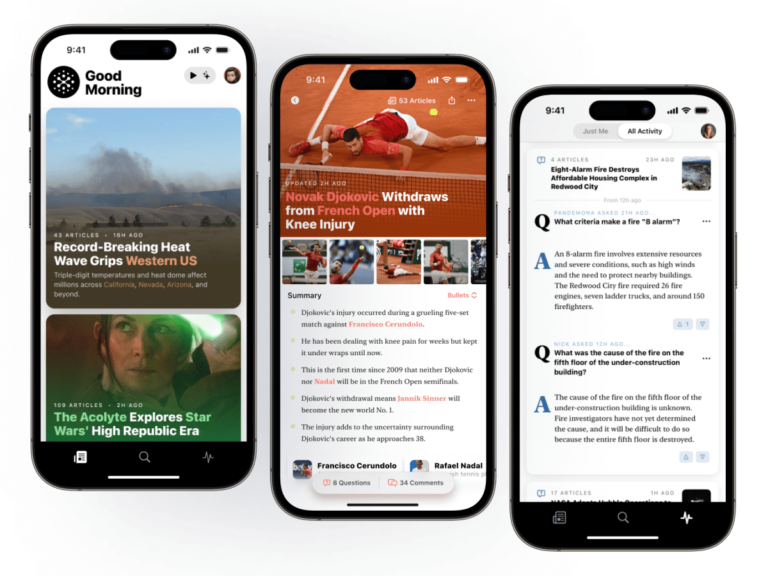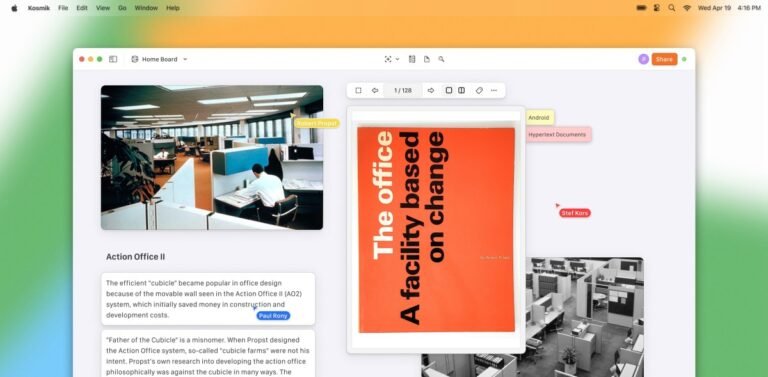
Traffic is down, newsrooms are undergoing layoffs, and publishers fear that AI technologies will only make matters worse.
Entering the fray, news reader startup Particle is teaming up with publishers to seek out a new business model for the AI era, where AI summaries of news don’t have to mean lost revenues.
Now, the company is bringing its first publishing partners into the mix to help it guide its next steps.
As a start, Particle now subscribes to Reuters newswire to help it deliver information about current events in the news.
What Particle isn’t yet ready to reveal is its business model.

Artifact, the well-received AI-powered news app from Instagram’s co-founders, Kevin Systrom and Mike Krieger, may not be shutting down as planned.
“It takes a lot less to run it than we had imagined,” Systrom confirmed to TechCrunch, adding that it’s just himself and Krieger running Artifact right now.
Artifact made a splash at launch, not only because it was the first major effort at a new social app from Instagram’s co-founders, but also because of its clever use of AI.
pic.twitter.com/5PaMavJbNS — @samhenrigold@hachyderm.io (@samhenrigold) March 16, 2024Following Artifact’s announcement of its impending closure, interest in using AI to summarize the news has heated up.
Browser startup Arc implemented an AI-powered “pinch to summarize” feature ahead of its $50 million fundraise.

In the last 12 months, reader apps have adopted AI to change how users consume news.
However, developer Nate Parrott’s app Feeeed (it’s four Es), which is available for iPhones and iPads, focus more on creating an algorithmic timeline to combine different sources.
The appJust like any reader app, Feeeed lets you add RSS feeds to your timeline.
“The whole idea of a news feed for yourself, on your own terms is still key to understanding the app, I think.
“The big challenge for Feeeed is giving people a feed that feels deeply personal without asking them to do too much work.

A team led by former Twitter engineers is rethinking how AI can be used to help people process news and information.
The startup was founded last year by former Senior Director of Product Management at Twitter, Sara Beykpour, who worked on products like Twitter Blue, Twitter Video, and conversations, and who spearheaded the experimental app, twttr.
She had been at Twitter from 2015 through 2021, growing her position from software engineering to that of a senior director of product management.
The premise behind Particle, as Beykpour explained last month, is to make it easier to keep up with news using AI.
We’re hoping to talk in more detail about how Particle vets its sources closer to a public launch.

A team led by former Twitter engineers is rethinking how AI can be used to help people process news and information.
The startup was founded last year by former Senior Director of Product Management at Twitter, Sara Beykpour, who worked on products like Twitter Blue, Twitter Video, and conversations, and had spearheaded the experimental app, twttr.
She had been at Twitter from 2015 through 2021, growing her position from software engineering to that of a senior director of product management.
The premise behind Particle, as Beykpour explained last month, is to make it easier to keep up with news using AI.
We’re hoping to talk in more detail about how Particle vets its sources closer to a public launch.

Kosmik was founded in 2018 by Paul Rony and Christophe Van Deputte.
And that’s when he started to build Kosmic, Rony told TechCrunch, drawing on a prior background in computing history and philosophy.
It also features a built-in browser, saving users from having to switch windows when they need to find a relevant website link.
Additionally, the platform also sports a PDF reader, which lets the user extract elements such as images and text.
“I think that everything revolves around the idea that we do not have the best web browser, text editor or PDF reader,” Rony said.









